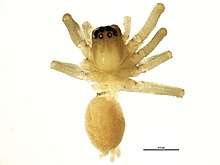Strotarchus
Strotarchus is a genus of araneomorph spiders in the family Cheiracanthiidae that was first described by Eugène Louis Simon in 1888.[4] Originally added to the Clubionidae,[4] it was moved to the Miturgidae in 1967,[5] and to the Cheiracanthiidae in 2014.[6] It is considered a senior synonym of Marcellina[3] and Coreidon.[2]
| Strotarchus | |
|---|---|
 | |
| S. piscatorius from the Great Smoky Mountains National Park | |
| Scientific classification | |
| Kingdom: | Animalia |
| Phylum: | Arthropoda |
| Subphylum: | Chelicerata |
| Class: | Arachnida |
| Order: | Araneae |
| Infraorder: | Araneomorphae |
| Family: | Cheiracanthiidae |
| Genus: | Strotarchus Simon, 1888[1] |
| Type species | |
| S. nebulosus Simon, 1888 | |
| Species | |
|
20, see text | |
| Synonyms[1] | |
| |
Species
As of September 2019 it contains twenty species, found in South America, Mexico, the United States, Costa Rica, and Pakistan:[1]
- Strotarchus alboater Dyal, 1935 – Pakistan
- Strotarchus beepbeep Bonaldo, Saturnino, Ramírez & Brescovit, 2012 – USA
- Strotarchus bolero Bonaldo, Saturnino, Ramírez & Brescovit, 2012 – Mexico
- Strotarchus gandu Bonaldo, Saturnino, Ramírez & Brescovit, 2012 – Brazil
- Strotarchus jacala Bonaldo, Saturnino, Ramírez & Brescovit, 2012 – Mexico
- Strotarchus mazamitla Bonaldo, Saturnino, Ramírez & Brescovit, 2012 – Mexico
- Strotarchus michoacan Bonaldo, Saturnino, Ramírez & Brescovit, 2012 – Mexico
- Strotarchus minor Banks, 1909 – Costa Rica
- Strotarchus monasticus Bonaldo, Saturnino, Ramírez & Brescovit, 2012 – Mexico
- Strotarchus nebulosus Simon, 1888 (type) – Mexico
- Strotarchus piscatorius (Hentz, 1847) – USA, Mexico
- Strotarchus planeticus Edwards, 1958 – USA, Mexico
- Strotarchus praedator (O. Pickard-Cambridge, 1898) – Mexico
- Strotarchus silvae Bonaldo, Saturnino, Ramírez & Brescovit, 2012 – Peru
- Strotarchus tamaulipas Bonaldo, Saturnino, Ramírez & Brescovit, 2012 – Mexico
- Strotarchus tlaloc Bonaldo, Saturnino, Ramírez & Brescovit, 2012 – Mexico
- Strotarchus tropicus (Mello-Leitão, 1917) – Brazil
- Strotarchus urarina Bonaldo, Saturnino, Ramírez & Brescovit, 2012 – Peru
- Strotarchus violaceus F. O. Pickard-Cambridge, 1899 – Mexico
- Strotarchus vittatus Dyal, 1935 – Pakistan
gollark: I'd also like to note the fact that the original trade hub was the minimum viable product and didn't even have proper rules.
gollark: Caught a what?
gollark: Meaning, of course, that it will never happen.
gollark: There's a suggestion thread for it...
gollark: I picked up a ridgewing because its code was slightly cool. Turns out it's tan. Yay!
References
- "Gen. Strotarchus Simon, 1888". World Spider Catalog Version 20.0. Natural History Museum Bern. 2019. doi:10.24436/2. Retrieved 2019-10-06.
- Ramírez, M. J.; Grismado, C.; Blick, T. (2004). "Notes on the spider family Agelenidae in southern South America (Arachnida: Araneae)". Revista Ibérica de Aracnología. 9: 181.
- Edwards, R. J. (1958). "The spider subfamily Clubioninae of the United States, Canada and Alaska (Araneae: Clubionidae)". Bulletin of the Museum of Comparative Zoology. 118: 373.
- Simon, E. (1888). "Etudes arachnologiques. 21e Mémoire. XXIX. Descriptions d'espèces et de genres nouveaux de l'Amérique centrale et des Antilles". Annales de la Société Entomologique de France. 8 (6): 203–216.
- Lehtinen, P. T. (1967). "Classification of the cribellate spiders and some allied families, with notes on the evolution of the suborder Araneomorpha". Annales Zoologici Fennici. 4: 321.
- Ramírez, M. J. (2014). "The morphology and phylogeny of dionychan spiders (Araneae: Araneomorphae)". Bulletin of the American Museum of Natural History. 390: 342. doi:10.1206/821.1. hdl:11336/18066.
This article is issued from Wikipedia. The text is licensed under Creative Commons - Attribution - Sharealike. Additional terms may apply for the media files.